‘Dorothea The Doozy’ Small woman with a big voice
‘Dorothea The Doozy’
RTE Lyricfm – The Lyric feature
In February Ocarina’s production Dorothea The Doozy was broadcast on RTE Lyricfm with BAI and RTE sponsorship. Dorothea Herbert is the long overlooked Tipperary writer, diarist, poet and artist from Carrick on Suir. She is often compared with Jane Austen who was writing around the same time. Scandalous affairs, romantic liaisons, fashion reports, crazy practical jokes and shocking stories of domestic violence against women in the upper classes, are all there. Unlike Austen though, Herbert was writing about real people and relations. In her ‘Retrospections of an Outcast’, written about her life from 1780 to 1806, she reveals a unique insight into everyday society for the land-holding Herbert family and their class in Ireland.
Colourful Characters and a Hopeless Romance
Her descriptions of parties, visits to the races and seaside, a gender-fluid visitor, camp gay cousins, groping relatives, trips to relatives in Muckross in Killarney all paint a colourful unique picture of her life in Tipperary in the late 1700s. She also writes about her romantic attachment to John Roe of Rockwell who she believed she was married to ‘spiritually’, even though he never even proposed to her. Experts believe this relationship may have been a product of her vivid imagination or a literary device or that he may have been teasing her and leading her on. She seems to believe it was real and even refers to herself as Dorothea Roe. She is a talented artist and her work has a certain cartoon quality to it. She illustrates her book with her own watercolor paintings she refers to as ‘cuts’.
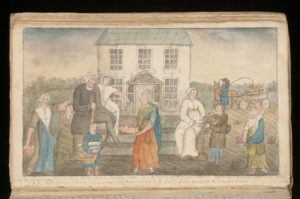
Original Inspiration – So Few Women
The idea for the Lyric feature radio documentary came from a conversation with Dr. Jane Maxwell, Manuscripts Curator, Manuscripts and Archives Research Collections in Trinity College who says in the programme that “This is such an unusual artefact to have survived and she herself is such an unusual person- and there are so few records of women from the eighteenth century surviving anyway so that when you have somebody like her, leaving behind an artefact like this it is unprecedented, it’s unique, it’s unheralded, it’s unexpected, it is unhoped for.”
The original handwritten and illustrated book is under her expert care in Trinity College and it felt very special to be able to look at it and at the watercolour cuts by Herbert, in the quietness of the old library building only occasionally interrupted by seagulls and excited students outside.
Colourful Visitors Listen here to Aideen Wylde as Dorothea Herbert describing a colourful visitor
Carrick on Suir Social History
Dorothea Herbert was from Carrick on Suir in County Tipperary and her father Nicholas Herbert was the Church of Ireland rector there – the grounds and church are now the location of the renovated Heritage Centre. She was the eldest in the family, not very tall and not gifted in the looks department either she writes, and she often comments on other pretty girls. Some of these girls however are married off at age 15. Herbert is a talented writer who likes to display her learning and to let us know the writers she herself has read, despite a haphazard and scrappy education. Every chapter of Retrospections begins with a quote from poets like Alexander Pope. One of her longer poems The Buckiad is possibly inspired by Popes work The Dunciad a mock heroic poem.
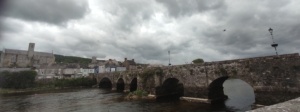
Carrick on Suir on the day of recording 2022
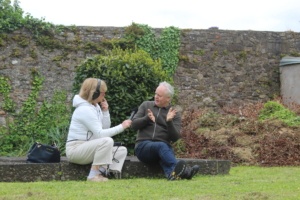
Johnny Fitzpatrick Carrick on Suir Local Historian and Herbert fan
Role of Women in 18th Century Ireland
Her memoir sheds light on the role of women and domestic life in rural Ireland in the late 1700s and early 1800s, for the Anglo Irish class. She had a huge network of relatives and friends and writes about people and cousins from Tipperary, Waterford, Galway, Killarney and Kilkenny and also in England. She writes in a time of great upheaval worldwide -the French Revolution, American War of Independence, the agrarian uprisings in Ireland and 1798 rebellion in Ireland. While these are referenced in her book and later diary extracts, her poetry and memoir are focussed mostly on her domestic world and the confined role of women as either wives or spinsters. She was deeply upset by the murder of her father’s proctor during the 1798 Rebellion. It was horrific, a double murder carried out in her own house which she must have found very traumatic. Her Retrospections were only published for the first time in 1929 and Dr Jane Maxwell believe’s she would never have expected her work to be published but would have used it as a way of explaining her mental trauma and non married status to her family.
Unique Descriptions of 18th Century Childhood
Herbert’s early recollections about her childhood are a unique resource for anyone interested in how children lived and played in that time. She describes episodes when she and her brothers got an old gardener to plant laurel trees from the garden in an attic which later collapses. She recalls dressing up as shepherds, getting drunk with other children, making beauty potions as young women and wearing masks to protect their faces from the sun. She also tells of how her brothers tried and failed to set Mrs O’Hara the music teacher on fire , all because she beat them at cards. She describes strange visitors, wandering teachers from Italy and France who taught dancing and French and how to make soup with added frogs – which she declined. She also admires beautiful dark haired exotic visitors born in India.
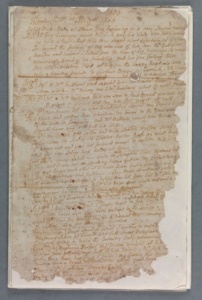
Diary Fragments
Some of Dorothea’s later diary fragments, also preserved in Trinity College Library, show a woman sinking into despair, in mental distress, alone in her room and increasingly isolated from her family. The conservation experts in Trinity College Library have used special techniques to preserve these damaged diary fragments dated from 1806 and 1807. They portray a very different Dorothea now in significant distress and anguish and mistreated by her family she says.
Diary entry Thursday 13th August 1807
“I was again this morning dragged upstairs and laid with brutal violence on the floor of my Bedchamber fortunately I happened to be stronger for such an attack as I was the other day else I am certain I would have died under the usage I received Every vein in my arm is starting and Covered over with black bruises from his Iron grasp. A Shameless set of people looking on Unmoved My Lady housemaid indeed interfered so far as to help him to drag me up and then so condescending as to bid me be quiet – his hardened old mother and sisters were totally unmoved.”
Listen here to Aideen Wylde as Dorothea Herbert 1806 Chapter 142nd Retrospections of an Outcast >>
Giving Voice To Dorothea
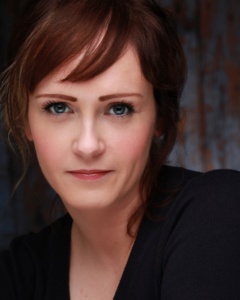
Actor Aideen Wylde
In the documentary her words are brought to life by Tipperary actor Aideen Wylde reading several anecdotes from the Retrospections that Herbert writes about so beautifully and also some of her later more distressing diary extracts. Some are comical, others distressing and sad. What is striking is how violence, specifically domestic violence against women, was commonplace at all levels of society in the late 1700s early 1800s.
1804 Chapter 139th Violence against Sophy her sister
“Sophy before her marriage went to Knockgrafton to settle what Tythe Money was due before she commenced Bride for she had always assisted in settling the Parish Affaires -The important Day arrived – we had the large Party to Dinner and a much larger one in the evening – the Bride looked very handsome and her settlement caused universal joy. The Young Couple remained here until all matters were arranged for their Reception at Ballina – but his mother dying soon after both Father and Son fell into a strange, straggling kind of life – They quarreled with this family about Money Matters – and his Young Wife seldom saw him – She had however the joy of bringing him and Heir christened Ambrose Mandeville – Her fondness for the Child made her more quietly bear the injurious conduct of her Husband – She went to settle at Ballina but his Brutality soon obliged her to return – He often came to beg pardon, but as often Offended and all her friends advised her to keep safe under the paternal roof.”
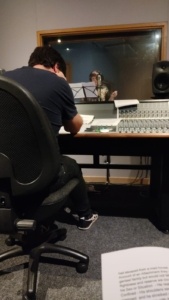
Sound Engineer Pat Wall during Aideen Wylde’s recording
Expert Contributors
Dr Jane Maxwell Trinity College Dublin.
Background information, context and explanation of the works of Herbert come from Dr Jane Maxwell Manuscripts Curator, Library and Archives Research Collections in Trinity College Dublin. The manuscript is written in Dorothea’s own handwriting and is foolscap size. As an historian and expert on women’s history and the writings of Herbert Dr Maxwell brings insight and historical social context to the documentary and most of all fascination and enthusiasm.
Dr Mary Breen University College Cork
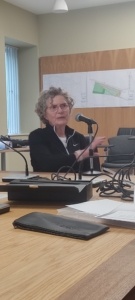
Dr Mary Breen from the School of English UCC is featured. Dr Breen did her Oxford Doctoral Thesis on Dorothea Herbert and is an expert on women writers in Ireland of the period. She talks about Dorothea’s gifted literary visual and comedic style and how it is obvious that she was widely read. She also talks about how she was received in different ways by other writers
Both Maxwell and Breen discuss whether the character of John Roe was a real or imaginary lover of Herbert’s or a literary device she uses to explain herself to her family.
Anne Tannam Creative Writing Coach
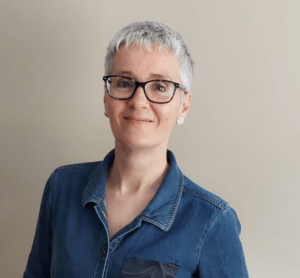
Also featured is poet Anne Tannam who teaches journaling for creativity and mental health. This is to show how Herbert used journaling and diary keeping as a wellspring for creative writing and poetry and as a way of keeping a handle on her mental health which suffered serious decline in her later years.
Johnny Fitzpatrick
Local Herbert enthusiast Johnny Fitzpatrick adds local knowledge and insight and is a true fan of Herberts. He was recorded in the grounds of Carrick on Suir Church of Ireland where the Herbert family plot is located. atmosphere and help deliver the story in a rich audio texture.
Thanks to The Late Frances Finnegan
We would have liked to interview the late Frances Finnegan author of ‘Introspections the Poetry and Private World of Dorothea Herbert’ but were unable to due to Coid restrictions at the time of recording. Her book is available from Congrave Press
Produced Written and Presented by Angie Mezzetti
All parts of Dorothea The Doozy are woven together with voiced links written and performed by Angie Mezzetti, researcher, writer, presenter and producer.

Photographer Paul Sherwood paul@sherwood.ie
Additional research Nina Mullen
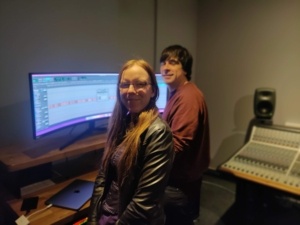
Nina Mullen Radio Student and Sound Engineer Patrick Wall in DFEi state of the art recording studio.
Music from 18th Century
Music was a major part of Dorothea Herbert’s life and she refers to music from the era both nationally, internationally and from the locality. Herbert who was a singer and played piano and harpsichord and the family had a live-in music teacher and singer Mrs O’Hara. Music referred to by Herbert including baroque favourites are used in the documentary feature.
Tracks include
Push About The Jorum
Gramachree Grà mo croí
The Soldier Tir’d
Handel’s oratorio
The Beggar’s Opera ‘Over the hills and far away’.


